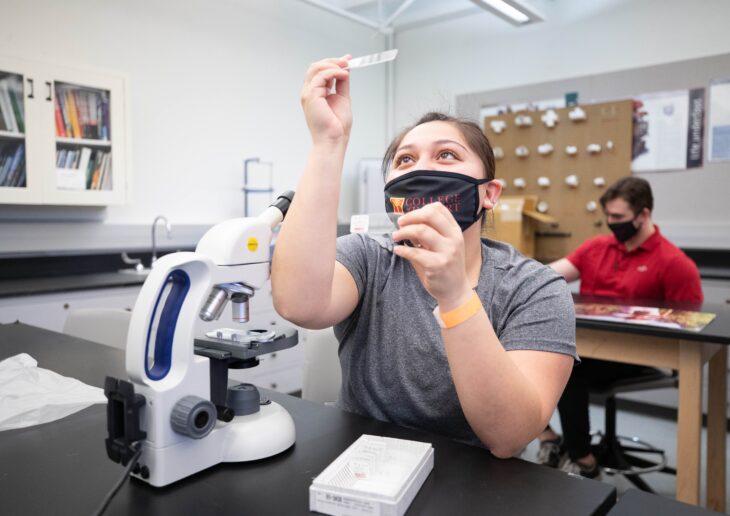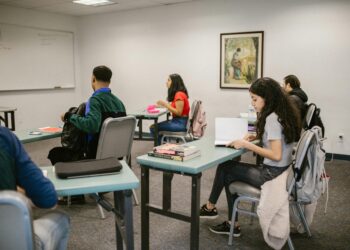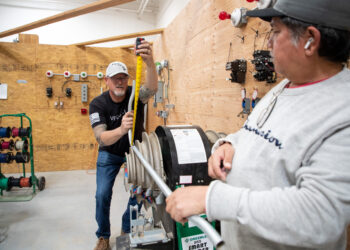
Culinary careers are sizzling again as the hospitality and restaurant industry bounces back from the pandemic and seeks to fill the positions vacated during the COVID-19 downturn. Chaffey College is doing its part to get more cooks in the kitchen.

The masks stayed on in 2021, but the identity of “Ready” career education in the Inland-Desert region is no longer a secret.
From first responders to the last line of cyber-defense, health care heroes to supply-chain superstars, career education was on the cutting-edge as California continued to battle a crisis. While 2020 was a year of adaptation for our colleges, 2021 was a year of innovation.
“How do we create a culture of creative thinking and innovation within our entire community college system?” asked Lisa Kiplinger-Kennedy, Regional Director for Business & Entrepreneurship Employer Engagement, who faced the particularly sticky challenge of delivering STEM labs and makerspaces in a safe, hybrid format. For the Director, the region’s “Innovation Empire” moniker is well-earned. “[Innovation] is going to be a driving point for the rebound for our community as a whole.”
With a year of pandemic practice under their belts and the “remote learning” problem solved, regional directors like Kiplinger-Kennedy began to think bigger, harnessing some of those same connectivity solutions to reimagine the way they serve students, long-term. Meanwhile, with new urgency placed on essential pathways like nursing, public safety and transportation, the directors’ perennial task of connecting programs to workforce partners became more critical than ever.
“We started our program here specifically because employers voiced that need,” says Victor Valley College’s Lilia Aguirre, who co-led a recent effort to establish an apprenticeship pathway for in-demand Community Health Workers. “’What we do is support each other to build innovative apprenticeships.”
The inspiration for innovation has been contagious, with each and every “Ready” sector reporting game-changing success stories in 2021. Today, we’ll take a look back on some of the efforts of Inland-Desert colleges and coordinators, and how they continued to raise the bar for career education in The Year of the Ox.
Success at your service
The hospitality industry was among the pandemic’s biggest early victims, but in a post-vaccine world, it has rubber-banded back. From head chefs to hospitality managers, the industry is looking at 1.6 million vacant jobs nationwide.
The problem is magnified in tourism-dependent places like the Coachella Valley, where understaffed hotels and restaurants translate to lost income and damaged reputations. And while the situation is dire, help is on the way, thanks to efforts like College of the Desert’s “Be My Guest” project.
Spearheaded by Hospitality Management instructor Yolanda Bender, the initiative unlocked three new job-ready pathways, benchmarked and certified by the American Hotel & Lodging Educational Institute (AHLEI). With jobs in the industry paying $20 per hour and more, more Inland-Desert Colleges are beginning to make plans to follow suit
“The solution is community colleges like College of the Desert,” says industry partner Daniel Loera, President of RevPAR Lobby Hospitality. “The growth of hospitality management programs within community colleges will enable our industry to meet current and future workforce demands.”
Accelerating access in health care
For underserved Californians, affordable career education has always been an equalizer. But as the health crisis transformed into an economic crisis, it became more important than ever for colleges and employers to chip away at financial barriers to higher education.
Facing life-and-death urgency, employers in the health care sector turned to Inland-Desert colleges to supercharge classroom-to-career pipelines. For two colleges, that increased demand would dovetail perfectly with efforts to provide more opportunity to low-income and traditionally underserved students.
Palo Verde College used a private grant to launch a lightning-fast Certified Nursing Assistant (CNA) pathway in 2021, and it’s first, 15-student cohort is well underway. Meanwhile, Victor Valley College worked with Desert partners to develop a tuition-free apprenticeship for Community Health Workers (CHW).
“The skills acquired through this apprenticeship program help address many of the socioeconomic barriers that our hard-to-reach populations experience,” says Dr. Yara William, Director of Health Workforce at community organization Reach Out.
Kat Currier, Registered Nurse at Blythe Post Acute Medical Center, is more blunt upon reflecting on the impact of Palo Verde College’s health care graduates: “We probably would have no staff if it weren’t for the College continuously turning out great CNAs for us every year.”
First choice for first responders
The “tuition-free” trend wasn’t limited to the health care sector. In response to a rising need for first responders, Moreno Valley College partnered with the Riverside County Workforce Development Center to offer free EMT training for qualified prospects.
The program, which also covers essentials like books, equipment and certification, hopes to provide relief for employers like American Medical Response, which is currently adding about 25 EMTS per month to combat a skills shortage. At the same time, it’ll be coming to the rescue for low-income students looking for a rock-steady income.
“Between our fire and EMS programs, within three months of completion of those programs, we pretty much have 100-percent employment,” says Phil Rawlings, Dean of Instruction for the School of Public Safety at MVC’s Ben Clark Training Center.
Career ed connects
For ”Ready” community colleges, 2021 was as much about connection as it was innovation. From virtual conferences and workshops to remote solutions for hands-on lab instruction, it was a year of new technology, new partnerships, and most impactful of all, new ways of thinking about career ed connectivity.
In April, more than 300 participants gathered virtually to take part in the IEDRC Counselor Conclave, representing the largest turnout in the history of the annual event. The Conclave included speakers and breakout sessions covering contemporary topics in K-12 and college counseling. Most importantly, organizers say, it gave counselors an opportunity to feel connected.
“It definitely opened the line of communication and gave counselors a place to go to learn,” says K-12 Pathways coordinator Jessica Swift.
While counselors were re-thinking CTE pathways, instructors in fields like STEM and logistics were focused on high-tech solutions for distanced learning. At San Bernardino Valley College, the Electronics Technology program deployed cutting-edge, LabVolt software to simulate about 85 percent of its previously in-person lab work.
Meanwhile, Moreno Valley College developed a virtual makerspace to stand in for its brand new, 4,000-square-foot live space, which was shuttered by the pandemic just a few months after opening in December 2019. MVC was one of several schools, along with SBVC and Mt. San Jacinto College, that managed to employ makerspaces to produce life-saving PPE at the height of the pandemic.
“We definitely want to get people back into making, designing, tinkering and exploring in the makerspace,” says MVC Project Supervisor Jason Kennedy. “As we look at a post-pandemic world, the shift is going to allow for both in a hybrid fashion.”
Confident to the CORE
Real estate management skills have become a hot property in the Inland-Desert region, and thanks to $1 million in state funding, these in-demand careers will be accessible to more students than ever before.
Chaffey College’s “CORE Academy,” launched in 2021, provides a unique certification in property management to meet demand in the region, which is expected to surge by 43 percent in the next five years. The non-credit, tuition-free program is offered in partnership with property management company National CORE, which saw a chance to empower the local workforce and grow the industry.
“It’s a really great starting point for someone to earn a living and create a very clear pathway out of poverty,” says Chaffey College Associate Superintendent of Instruction and Institutional Effectiveness Laura Hope. “I don’t think it will be long before it fills the classroom.”
We’re Ready to ring in 2022. Contact us with your Inland-Desert career education success stories.

Culinary careers are sizzling again as the hospitality and restaurant industry bounces back from the pandemic and seeks to fill the positions vacated during the COVID-19 downturn. Chaffey College is doing its part to get more cooks in the kitchen.

Dual Enrollment (DE) is catching on as students and their families recognize the advantages of earning college credit while still working towards high school graduation. But students aren’t the only… Read More – Good News for Community Colleges: Dual Enrollments Are on the Rise

Enrollment in courses not offering credit toward a degree or certificate are outpacing for-credit programs in some states (Fed Communities). And it’s no wonder. With the convenience, minimal time commitment,… Read More – No Credit, No Problem: Noncredit Courses Gain Steam